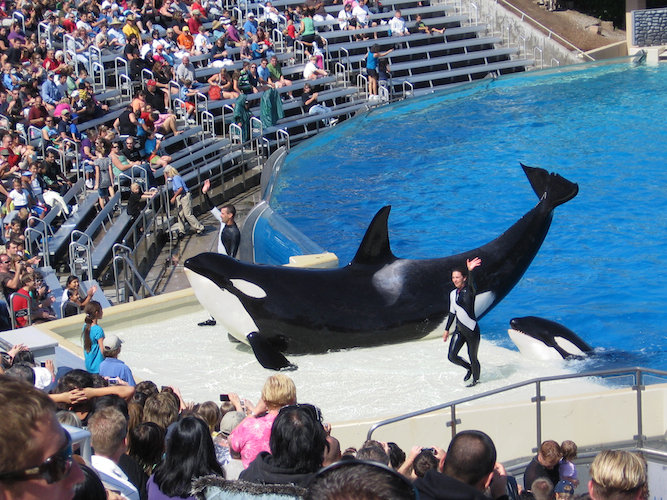For the past few days my Facebook feed has been inundated with posts concerning the protest on the behalf of Lolita, the imprisoned orca at the Miami Seaquarium.
The activism and awareness spurred from the documentary Blackfish continues to gain momentum and the pressure continues to mount on those that guard the tanks.
The scene of Lolita breaching in cold North Pacific waters surrounded by her family with the San Juan islands in the background, is certainly a powerful and romantic image. An image and ending almost too good to be true. Yet we are many steps away from that reality, and on borrowed time.
The conversation unfortunately begins and ends with those that, for legal purposes, “own” Lolita. The proposals seem to be gravitating toward the idea of the aquarium deciding that the time has come to retire Lolita from the show business as a way of thanking her for her decades as a forced laborer.
Some have suggested the positive media coverage would offset the loss of those that attend the aquarium solely to see the orca. It would be an incredible gesture, and sadly, a dramatic change in philosophy. She remains a massive source of income for them and it seems unlikely they would willingly part with her.
Just last year a U.S. district judge threw out a case proposed by the orca network, PETA, and others protesting the United States Department of Agriculture’s (USDA) renewal of the aquarium’s license. Claiming that the marine parks tank was too small and in violation of USDA standards. The case was dismissed as the judge determined the animal welfare act (AMA) did not specify requirements for those already holding USDA permits.
It is a frustrating and despicable minefield of red tape and bureaucracy that now seems firmly on the aquarium’s side. There appears to be no hope in the near future of government intervention forcing the release of Lolita.
Meanwhile National Ocean and Atmospheric Administration (NOAA) is proposing Lolita be included in the Endangered Species Act (ESA) since she remains a member of the Southern Resident Population. Public comment closes on the 24th of this month, if she does indeed qualify as a protected member of the population, the hope is that she would no longer be allowed to be used as a revenue stream. Should the motion pass, I’m confident the aquarium would fight tooth and nail to ensure that she remains where she is. A long legal battle would probably ensue, where, as we know, the system moves very slowly. The courts have already sided with the aquarium once for much flimsier reasons and I’m hesitant to believe that they would redeem themselves this time. I pray I’m wrong.
Which leads us back to the aquarium doing it on their own. Yes, Sea World stock is plummeting, marine park public opinion is at an all time low, and yet, Sea World’s response seems to be to throw more money at the problem and I imagine Miami’s response would be the same. It continues to confound me what my fellow man will do for profit but it is most likely the only voice that they will answer to. We must continue to ensure that revenue continues to fall, in hopes that they realize they must cut their losses and salvage what public opinion they can. They must reach a point however, where the cost of keeping Lolita is higher than what she brings in. It feels so taboo and dishonorable to make Lolilta’s case come down to money, but I fear it’s the only outcome with a happy ending.
So we will protest, we will hold signs and picket. Give copies of Blackfish to our friends that continue to attend the parks. Support animal advocacy groups, volunteer, and write our congressmen. Real change is happening and I pray that it comes before it is too late for Lolita, Corky and the others.
The best case scenario may be a net pen, the waters of Juan de Fuca on her skin. After 40 years of swimming in slow circles, it would be a miracle to see her travel hundreds of miles with her natal pod. She could hear the calls of her family, her relatives and maybe remember what it means to be a wild whale after all these years. It’s hard to admit that she may have changed irrevocably, who wouldn’t after all those years alone. I may never buy a ticket to an aquarium, but would happily hand over my money to stand on the shore and see her in a cove, on the open water. No corny music, no tricks, no bleachers, no applause. Just a whale trying to be a whale again, chasing fish, and vocalizing without fear of the calls echoing off concrete walls. And know that the age of captivity, is coming to an end.
Love elephant and want to go steady?
Sign up for our (curated) daily and weekly newsletters!
Author: David Cannamore
Editor: Travis May
Photo: Wikipedia



Read 3 comments and reply